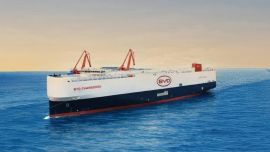Argentina’s historic US$65-billion deal with its private creditors merely marks the first stage of an uphill battle to rescue its crisis-prone, debt-laden economy.
President Alberto Fernández’s next step is to start talks for a new International Monetary Fund programme against a harrowing backdrop. Argentina is diving deeper into a three-year recession with rising poverty, inflation near 45 percent and multinationals fleeing the country’s increasingly difficult business environment.
The pandemic also significantly impedes the government’s room for manoeuvre, with Argentina among those countries struggling the most to recover from the outbreak, according to a Bloomberg Economics ranking of 75 emerging markets.
Negotiations over a US$44-billion debt with the IMF, which is still blamed by some Argentines for the country’s 2001 default when a Fund-sponsored bailout collapsed, promise to be challenging. Fernández’s government will have to balance the need to outline a path toward fiscal sustainability at a time when Argentina doesn’t have access to credit with navigating the nation’s notoriously treacherous politics.
“The debt restructuring is a positive step, but it’s far from constituting a definitive solution to Argentina’s many problems ahead,” said Martin Rapetti, economist at research centre CEDES in Buenos Aires. “It’ll be very important for Argentina to have an IMF program that achieves consensus across the political spectrum.”
The economy is poised to contract a record 13.5 ercent this year, according to Bank of America Corp’s estimates, and the government is financing an increasingly wider budget deficit to tame growing social demands derived from the coronavirus via money printing.
Complicated duo
So far, Fernández is on good terms with IMF Managing Director Kristalina Georgieva, a change from past turbulent ties between Peronist administrations and the Washington organisation and even recent criticism from the president, who partly blamed the IMF under Christine Lagarde’s leadership for the country’s crisis.
Still, the Fund’s staff and board will need to see a fully detailed plan before giving his government its stamp of approval, a mark of much-needed credibility in Argentina after it continued to support the nation amid its ninth default in May. And Fernandez himself concedes he doesn’t like to lay out a blueprint.
“Frankly, I don’t believe in economic plans,” Fernández told the Financial Times in July. “I believe in goals that we can set ourselves so that the economy can work toward achieving” them.
Economy Minister Martín Guzmán, the architect behind Argentina’s deal with private creditors, said Tuesday that grand plans “never worked in Argentina.”
“If you’re thinking that we’ll present a power point tying ourselves to rigid actions, we’re not going to do it,” he told reporters after the agreement. “Maintaining certain flexibility is fundamental.”
Argentina’s massive debt with the Fund, which should start to be repaid next year, stems from a failed attempt to bail out the government of Fernández’s predecessor, Mauricio Macri, in 2018. The program has effectively been on hold since Fernández’s unexpected landslide victory in a primary election in August last year.
A new programme, which will add to the more than 20 IMF agreements the country had since 1958, already faces major political and economic risks, according to Liliana Rojas-Suárez, a director at the Washington-based Center for Global Development and former senior IMF official.
“The hard work is coming now and that requires political will, and I don’t see it,” Rojas-Suárez said. “I’m not very optimistic about having a new IMF programme in the near future.”
One sticking point will be Argentina’s reliance on central bank money to finance its budget and the country’s lack of an anchor to bring inflation down.
The government faces mid-term elections next year, making difficult economic reforms unappetising to Fernández as he seeks to strengthen his voter base, Rojas-Suarez said. And his vice-president, Cristina Fernández de Kirchner, had long held an anti-IMF stance after her government got sanctioned by the organisation in 2013 for publishing inaccurate data.
The former president's support for any agreement will be important given her political clout. On Monday, in the final hours of negotiations with creditors, Guzmán went to Fernández de Kirchner’s apartment in Buenos Aires to discuss the details of the deal, according to a person with direct knowledge.
‘Good rapport’
A point playing in Argentina’s favour is the Fund’s recent move to adopt a more socially-conscious stance, prioritising poverty reduction and insisting less on austerity, said Nobel Prize Winner Joseph Stiglitz, Guzmán’s mentor.
“The role of the IMF has changed,” he said in an interview. Guzmán “was very smart to work very closely with the IMF on everything he was doing so I think they’ve established a very good rapport.”
At the same time, the IMF faces its own balancing act between getting its money back and being understanding with a country in need.
“They’re going to want to see the fiscal situation brought under control over time and made sustainable, while showing great sympathy to Argentina due to the hit from Covid-19” said Mark Sobel, a former US representative at the IMF now at the Official Monetary and Financial Institutions Forum think tank.
by Patrick Gillespie, Bloomberg
























Comments